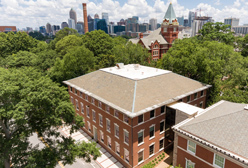New Sponsored Awards
The Center for Advanced Communication Policy (CACP) in the School of Public Policy was awarded $4.75 million in funding from the National Science Foundation for the Rehabilitation Engineering Research Center (RERC) for Wireless Technology. CACP Executive Director, Helena Mitchell, is Principal Investigator. (See feature story on right)
What Does Georgia Tech Think?
Selected Press for Ivan Allen College of Liberal Arts
|
Mitchell on CACP $4.75M DOE Grant
“This funding will allow us to move into new and emerging areas and leverage our relationships with the wireless industry, disability organizations, governmental agencies and other researchers and engineers to promote equitable access to wireless technologies and to develop new assistive technologies built on wireless platforms,” said Helena Mitchell, Executive Director of the Center for Advanced Communications Policy at Georgia Tech and principal investigator and co-director of the Wireless RERC grant. “This award affirms the growing importance of wireless technologies for those who have disabilities.” Source: Atlanta Business Chronicle, October 20, 2011
Best is Tracking Liberia Voting Violence through Social Media
Michael Best, Associate Professor in the Sam Nunn School of International Affairs and the School of Interactive Computing, will work with his research team using social media to spot possible irregularities and track violence during the Liberian election. The team will use an aggregator that pulls content from 20 different websites, including Twitter, Facebook, and SMS messaging services. Liberians will go to the polls early Tuesday morning in their second presidential election since a brutal civil war in 2003. Source: The Republic, October 10, 2011
EarSketch in AJC
"Georgia Tech received about $2 million in federal grants to support two projects designed to improve high school computer science lessons by making the material more interesting to students and by giving their teachers more training. About half the money will go toward a program that encourages students to study computer science by allowing teens to remix hip hop music by writing computer code [the EarSketch project led by Brian Magerko in LCC). The remaining money will go toward a three-year project [in the College of Computing] to produce and train more high school computer science teachers." (See October newsletter story on EarSketch) Source: Atlanta Journal Constitution - October 4, 2011
November 10, 2011
7:30 pm
November 11, 2011
12:00 pm
November 11, 2011
2:00 pm
November 11, 2011
3:00 pm
November 11, 2011
8:00 pm
November 13, 2011
2:00 pm
November 14, 2011
4:00 pm
November 15, 2011 - November 17, 2011
8:00 am
November 15, 2011
11:00 am
November 15, 2011
4:30 pm
November 16, 2011
7:00 pm
November 17, 2011
9:30 am
November 17, 2011
3:05 pm
November 17, 2011
4:40 pm
November 21, 2011
4:00 pm
November 28, 2011
4:00 pm
|

|
Connect with IAC Via Web and Social Media
|
National Search for Chairs in Literature, Communication, and Culture and Modern Languages
Dean Jacqueline J. Royster announced committees that are conducting national searches for new chairs in the Schools of Literature, Communication, and Culture and Modern Languages.
"We will be looking for successors who can continue leading these schools in an ambitious and dynamic way and who will be an asset for the executive leadership of the college in general."
The search committee for LCC is chaired by Greg Nobles (Director of the GT Honors Program, HTS) with committee members Philip Auslander, Ian Bogost, Rebecca Burnett, Celia Pearce, Aaron Santesso, Lisa Yaszek, and Kenya Devalia (all from LCC), David Shook (ModLangs), Ellen Zegura (CoC), and Cheryl Cofield (OHR).
The search committee for Modern Languages is chaired by Diana Hicks (SPP) with committee members: Vicki Galloway, Stuart Goldberg, Stephanie Boulard, Jin Liu, Ed Able (all from ModLangs); John Krige (HTS); Hamid Garmestanie (ME); and Pearl Alexander (OHR).
View the ModLangs Chair Search Announcement
View search committees for the chairs in Economics and International Affairs in the IAC August Newsletter
|
CACP Funded by $4.75 Million from NSF, New CACP Study Shows That Social Media is Improving Employment for People with Disabilities
The Center for Advanced Communications Policy has been awarded a $4.75 million, five-year grant from the U.S. Department of Education’s National Institute on Disability and Rehabilitation Research (NIDRR). The grant funds the center’s research and development of wireless technologies aimed at enhancing the lives of people with disabilities.
The third consecutive five-year grant awarded to the team of researchers and engineers, the funding enables the continuation of a decade of innovative research and engineering at the Wireless Rehabilitation Engineering Research Center (RERC), a collaboration between CACP (housed in IAC’s School of Public Policy) and Atlanta’s Shepherd Center.
“This funding will allow us to move into new and emerging areas and leverage our relationships with the wireless industry, disability organizations, governmental agencies, and other researchers and engineers to promote equitable access to wireless technologies and to develop new assistive technologies built on wireless platforms,” said Helena Mitchell, Executive Director of the CACP and Principal Investigator and co-Director of the Wireless RERC grant. “This award affirms the growing importance of wireless technologies for those who have disabilities.”
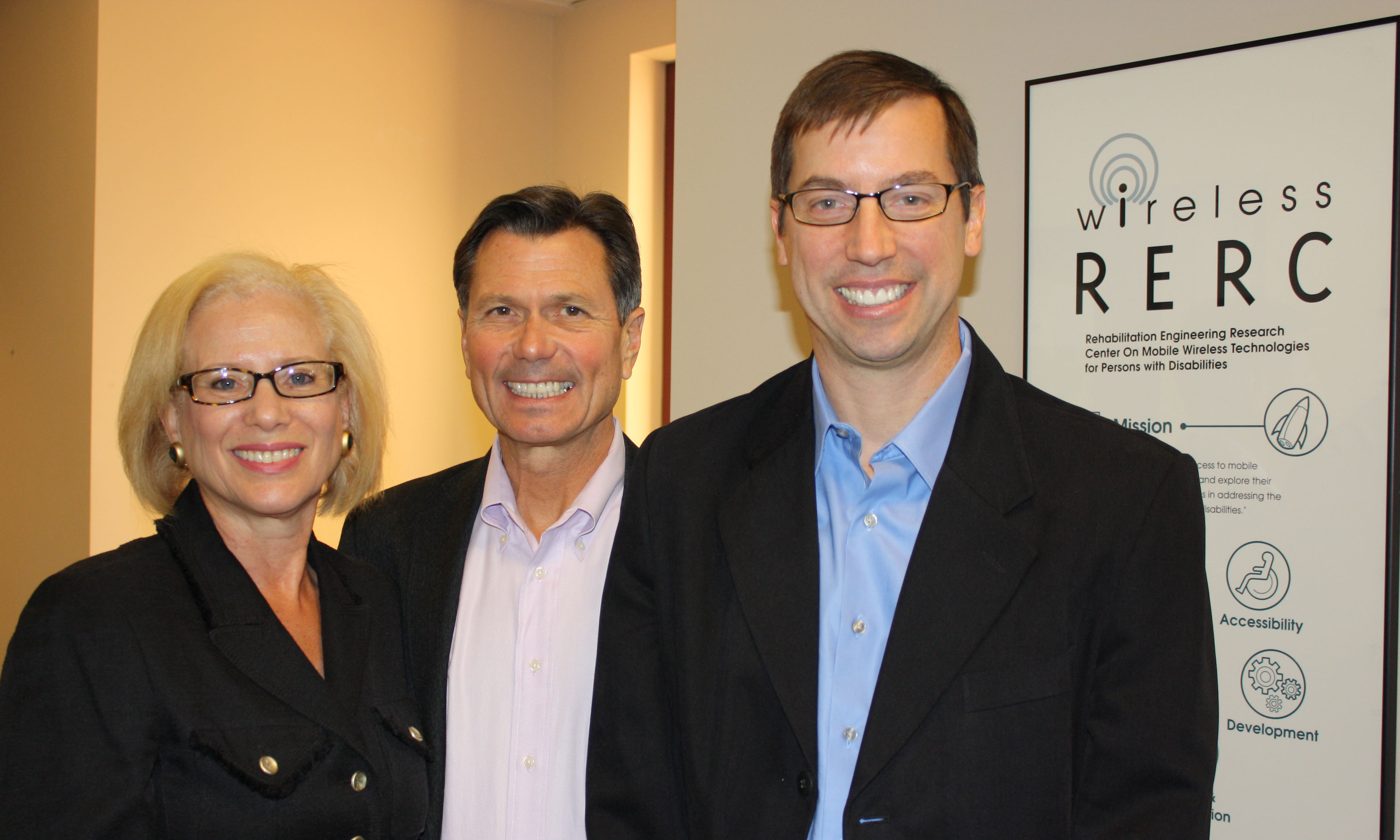 CACP's Helena Mitchell (l) with Mike Jones and John Morris (r) who are both research scientists at Shepherd Center CACP's Helena Mitchell (l) with Mike Jones and John Morris (r) who are both research scientists at Shepherd Center
In technology development, the Wireless RERC will launch a new incubator to develop software applications (apps); the Apps Factory will fund innovative internal and external ideas on a competitive basis to provide apps to people with disabilities across a wide range of platforms. This work will enhance accessibility to this critical wireless technology and build new assistive tools based on these “smart” wireless platforms. Additionally, the Wireless RERC will continue its work developing solutions to enhance the effectiveness and accessibility of emergency alerting and access to 9-1-1 emergency services.
The Wireless RERC will also continue its focus on consumer and public policy research, a crucial component of their work which encompasses wireless use and usability by consumers with disabilities, and studies that may shape the development of public policy, primarily related to general accessibility and emergency communications.
Over the years, CACP has submitted 29 filings for proposed rulemakings before the FCC and other regulatory agencies pertaining to issues of telecommunications access and emergency communications. CACP filings have been referenced or cited more than 60 times in ongoing rulemakings, including final rules and orders regarding advanced technologies and accessible mobile alerts.
The Wireless RERC is one of more than 20 RERCs in the United States. Other RERCs are devoted to fields such as aging, hearing impairment, visual impairment, public transportation, workplace accommodations, universal design, wheeled mobility, and information technology access.
Georgia Tech participants in the Wireless RERC also include the Center for Assistive Technology and Environmental Access (CATEA), College of Computing (CoC), Interactive Media Technology Center (IMTC), School of Public Policy (SPP), and the School of Psychology.
New CACP Report Shows Digital Media Can Improve Employment for People with Disabilities
Illustrative of the significant work being done in the CACP is a new report released October 4th, that shows that the networked economy and new digital media technology have transformed the employment landscape for adults with disabilities, especially for those under the age of 30.
“The Power of Digital Inclusion: Technology’s Impact on Employment and Opportunities for People with Disabilities” concludes that the transition to a new networked economy has the potential to provide more employment opportunities for people with disabilities. Released by the National Council on Disability (NCD), the report was submitted to the White House.
Previous research into the employment challenges faced by people with disabilities has focused on the scarcity of job opportunities and the perceived competitive disadvantages that they face. The new report focuses on the social capital and networking needed to match job opportunities with job seekers.
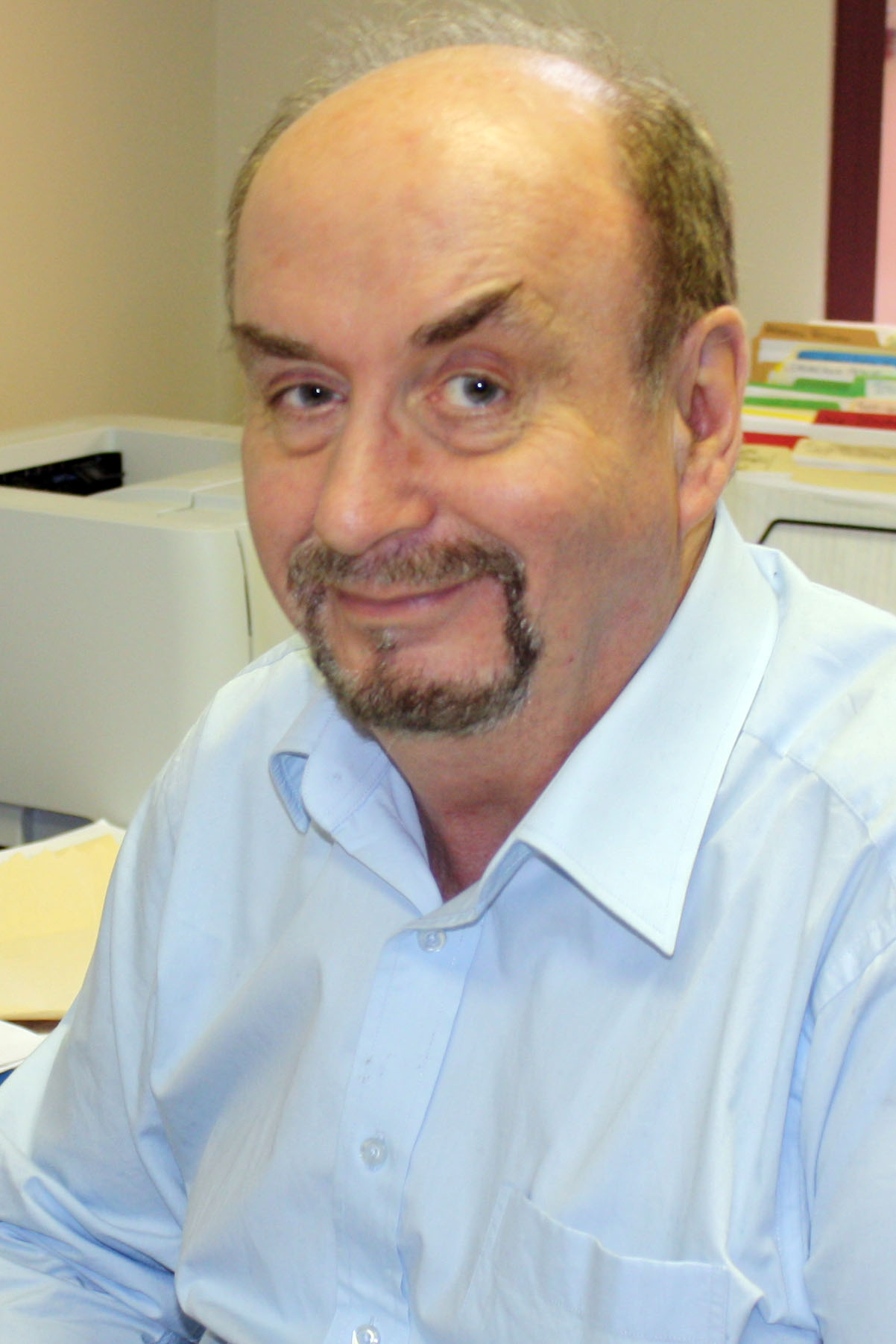 CACP Senior Research Scientist James White authored the report and oversaw a research team that included Paul Baker, Robert Todd, Nathan Moon, Brad Fain, Jessica Pater, and Carola Conces. CACP Senior Research Scientist James White authored the report and oversaw a research team that included Paul Baker, Robert Todd, Nathan Moon, Brad Fain, Jessica Pater, and Carola Conces.
The project looked at the disruptive possibilities of a set of key digital technologies on employment: wireless communication platforms; social networks; immersive digital environments, including virtual worlds and tiered digital interactions such as electronic games; open publishing; and open source processes.
Marking the launch of the report, the NCD hosted a virtual job fair October 4 to promote employment opportunities for people with disabilities, inviting government, non-government organizations, and private-sector employers to send in current employment opportunities. The positions were distributed via Twitter, Facebook, and the NCD listserv as examples of the technological opportunities described in the report. Photo: James White
|
Shapira Named Chair of New National Academies Committee on 21st Century Manufacturing
Philip Shapira has been named chair of a new National Academies committee that will examine "21st Century Manufacturing: The Role of the Manufacturing Extension Partnership (MEP) Program of the National Institute of Standards and Technology." Shapira is Professor in the IAC School of Public Policy and the University of Manchester.
Organized through the National Academies Board on Science, Technology, and Economic Policy, the new ad hoc committee comprises a panel of U.S. and international industrial, university, and policy experts. The committee will hold a series of fact-finding workshops and commission research papers and case studies to review and document the MEP program's current achievements, challenges, and new opportunities; identify and review similar national programs from abroad in order to draw on foreign practices, funding levels, and accomplishments as a point of reference; and discuss current needs and initiatives in light of the global focus on advanced manufacturing. Its first workshop will be held this month in Washington, DC.
Read about Philip Shapira
|
Alumnus, Doug Hooker, Named Executive Director of Atlanta Regional Commission
|
|
Douglas R. Hooker, an alumnus of the Ivan Allen College of Liberal Arts School of Public Policy and a member of the IAC Advisory Board, has been appointed Executive Director of the Atlanta Regional Commission following a national search. The ARC is the official planning agency for the 10-county Atlanta region and serves as a catalyst for regional progress by focusing leadership, attention, and planning resources on key regional issues. Hooker's election as the agency's fourth executive director was unanimous, and he was sworn in immediately following the October 31st vote by the commission. The ARC praised Hooker as a highly experienced professional with extensive ties to government, business, and nonprofit organizations throughout the Atlanta region and across Georgia. ARC Chairman, Tad Leithead said, “The committee conducted a nationwide search that attracted many qualified candidates, and Doug stood head and shoulders above them all. We are extremely fortunate to find the best candidate for this job, right in our own back yard.” “You honor me greatly,” said Hooker after being sworn in. “This is a critical time for our region. It is vital that we build on the great success of the Atlanta Regional Roundtable, build on our Livable Centers and Lifelong Community programs, secure water supplies for our future, and strengthen partnerships with public and private agencies throughout the region in order to lead metro Atlanta toward a more prosperous and sustainable future.” Hooker has been Vice President and Southern States Director for Atkins (formerly PBS&J) since 2005. Prior to that, he served as Executive Director of the Georgia State Road & Tollway Authority and was Commissioner of Public Works for the City of Atlanta throughout most of the 1990s and including the 1996 Olympics in Atlanta. Hooker's bachelor's degree was from Georgia Tech (Mechanical Engineering), and he holds a Master of Science, Technology, and Science Policy from the IAC School of Public Policy and a Masters of Business Administration from Emory University’s Goizueta Business School. Hooker is co-founder, board member, and former chairman of the Civic League for Regional Atlanta. He serves on numerous other boards, including the Metro Atlanta Chamber, the Council for Quality Growth, and the Emory University Board of Visitors. |
Bowman Speaks at Atlanta Federal Reserve on Limits to Sustainable Growth in Brazil
During a roundtable event at the Federal Reserve Bank in Atlanta focusing on new research on the economic outlook for Latin America, Kirk Bowman forecasted a cautious outlook for sustainable growth in Brazil.
“The past several years have witnessed the highest levels of sustained growth in the history of the Southern Cone, growth led by some good fortune of historically high prices for commodity exports such as soy and iron ore to China, but also led by some excellent policy decisions,” said Bowman, Associate Professor in the Sam Nunn School of International Affairs. “In the case of Brazil, raising the minimum wage, increasing human capital, incentivizing R&D, and expanding access to capital has lifted tens of millions of people from the lowest two income classes to the middle class. Unfortunately, while laudable, this growth has been achieved by picking the low hanging fruit."
Bowman shared conclusions from a decade-long research project indicating that long term, sustainable growth in Brazil faces challenges from poor infrastructure, a barely comprehensible tax code, limited high quality tertiary education, and an ineffective bureaucracy in some sectors handicapped by the electoral system. He utilized international tourism over the period 2000 to 2010 to illustrate the “underappreciated limits to growth in Brazil” and contrasted that with the potential for growth in Argentina.
Bowman said that global international tourism increased by 37.8 percent from 2000-2010. Argentine international tourism grew by 82.3 percent over the same period, while tourism in Brazil shrunk by 2.8 percent. In 2000, 5.31 million tourists visited Brazil and 5.16 million in 2010. Only 2.9 million tourists visited Argentina in 2000, but in 2010 the country surpassed Brazil with 5.3 million tourists.
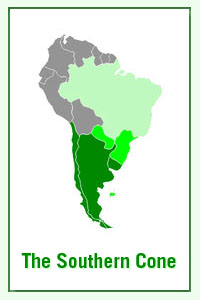
Bowman explained his research showing what has accounted for this differential.
“Cabinet formation is a scandal factory in Brazil with real consequences to the economy, jobs, and growth. Rio de Janeiro, for example, has six different police forces, all with different patrons and turf wars. Stadiums, airports, and other infrastructure are antiquated and renovations are behind schedule because of turf wars, bureaucratic rigidity, and weak leadership. If Brazil were to have experienced the regional average of tourism growth in the past decade, it would have created hundreds of thousands of permanent jobs and billions of dollars in revenue. If commodity prices do fall and the economy slows, Brazil might wish that it had not chosen a lost tourism decade. The mismatch of economic and democratic development on one hand, and institutional and bureaucratic weaknesses on the other threatens the country’s commitments to the World Cup and the Olympic Games and is a limiting factor.”
Bowman contended that the same characteristics of tourism are found throughout Brazil and result in the performance differences between Argentina and Brazil which he said, “were not the result of chance, but of policy and institutions. Institutions and capacity vary widely between and within countries. Brazil has many highly functioning institutions, but the failing institutions are a cause for considerable concern.”
“Understanding or predicting economic growth must go far deeper than macro policies,” he summarized. “Where you carefully examine bureaucracies responsible for growth, keep your focus on the four Cs: competence, cooperation, creativity, and continuation. If you find conditions similar to those in Argentina's tourism institutions, you can expect growth that exceeds expected macroeconomic predictions.”
This is an edited version of Dr. Bowman's remarks which were delivered during the October 19th roundtable at the Federal Reserve Bank of Atlanta entitled “Transforming Opportunities into Realities: Achieving Latin America's Growth Potential”. The roundtable brought together social scientists and policymakers from across the Southeast and Latin America to discuss new research on the economic outlook for Latin America. The event was sponsored by the Federal Reserve Bank of Atlanta Americas Center and the University of Miami Center for Hemispheric Policy.
|
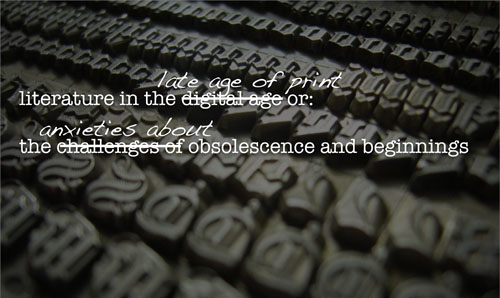
|
What is the Future of Literature in the Digital Age?
What has been the impact of e-books, videogames, online hypertext, and other forms of digital media on mainstream literature? The answer is: not much. What does that mean for the future of literature in the digital age?
“Literature has not responded creatively to new digital platforms,” said Jay David Bolter, Director of the James and Mary Wesley Center for New Media Research and Education in the School of Literature, Communication, and Culture (LCC). “Despite 20-30 years of digital media and with e-books now outselling paper books on Amazon, the literary community is still writing narrative for print, and the literary academy continues to study narrative within the historical category of literature (largely literature for print).”
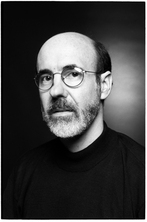 Bolter’s comments provided the context for the symposium, “The Future of Literature in the Digital Age,” hosted October 19th by the Wesley Center and the Graduate Program in Digital Media (DM), both in LCC. Bolter’s comments provided the context for the symposium, “The Future of Literature in the Digital Age,” hosted October 19th by the Wesley Center and the Graduate Program in Digital Media (DM), both in LCC.
“One might think that given the huge economics shift caused by e-books, the World Wide Web and social media, there would be a similar shift in the literature itself, but the overwhelming majority of e-books are just copies of the print book,” said Bolter. “The printed page and book, with their linear structure and well-defined relationship between author (as authority) and reader, remain the principal medium for literary expression.”
To examine those issues and explore the future of literature, Bolter, and co-organizer Maria Engberg of LCC’s DM program, brought together a roster of speakers who are at the forefront of experimentation and study in the field: Michael Joyce, author and professor at Vassar College; Steve Tomasula, author and professor at University of Notre Dame; and Ian Bogost, Director of LCC Graduate Studies in Digital Media.
New Forms and Possibilities
Joyce, Tomasula, and Bogost each offered reflections of the relationship between literature and visual and digital media. Joyce speculated on the ways in which the digital mediascape (the growing use of computers and networking technology for commercial communication and entertainment) affects traditional writing and other forms of media expression, such as filmmaking. Tomasula showcased some of his own experimental fiction, including the multimedia work entitled TOC, which consists of a kaleidoscope of texts, images, video, and audio, and can only be "read" on a computer screen. He discussed the technical and aesthetic issues that arise in crafting such a work. Bogost reflected on the intersection between literature and the most popular form of digital media today, the videogame. He has created a suite of four 'game poems' called A Slow Year, to explore that intersection.
Exploding Boundaries
Among the new digital aesthetics discussed by Engberg is multimodality. This type of innovative literature often uses visuals, graphics, and images in some form as part of a series of aesthetic and rhetorical strategies to achieve exuberant experiments in digital literature.
Engberg illustrated by describing reRead, an interactive digital projection installation by Simon Biggs that employs live, closed-circuit video, video sensing, generative grammars, and recursive image processing.
On entering the work, the viewer finds themselves electronically reflected in a life-size video projection composed of orthogonally opposed and reversed texts. The texts are constantly writing themselves into being, adapting their content and form in response to the viewer's movements. The texts that emerge, whilst initially seeming meaningful, are written without any sense of intent or contextual awareness, creating texts that are disassociated, but nevertheless evocative. As the texts grow in length, they also get smaller, eventually disappearing, then reappearing as entirely new large texts. The texts are reversed so they are most easily read by the viewer turning to face the mirror that is mounted on the wall opposite the projection. The visual field is sensitive to the movement of the viewer, distorting as the viewer moves, creating an elastic surface in which the viewer is reflected.
Engberg described reRead as conceptual, visual and responsive and said, "It turns the act of reading back on to the reader."
The Dissolution of the Traditional Experience of Literature
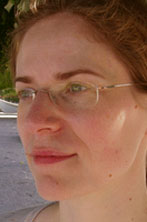 Engberg cited other types of innovations such as hypertext, which cedes the author’s control of the narrative to the online reader and allows alternate narratives. She said that these digital innovations are causing anxiety among both those in mainstream literature, and among readers. That anxiety revolves around not only the dissolution of the traditional experience of literature, but also around the very meaning of reading. Engberg cited other types of innovations such as hypertext, which cedes the author’s control of the narrative to the online reader and allows alternate narratives. She said that these digital innovations are causing anxiety among both those in mainstream literature, and among readers. That anxiety revolves around not only the dissolution of the traditional experience of literature, but also around the very meaning of reading.
“Reading is under scrutiny in many innovative literary works,” she said. “What does it mean to ‘read’ works like reRead that are truly multimodal, interactive, kinetic, and tactile? From the readers’ perspective, there can be a struggle to make sense of innovative work within familiar literary or artistic traditions.”
Engberg noted that the pressures of new media on literature have evoked a response in the literature similar to those seen during the technological evolutions of video, cinema, and television: a struggle to maintain a past position and status quo. That struggle co-exists alongside attempts to redefine the identity of literature in the context of a surging global culture of verbal-visual works opened up by the Web.
“The cultural status of print has reached a point beyond which print technologies do not sustain all the practices of writing and reading of our contemporary digital moment,” said Engberg. “The changes mean that print and digital will both house literary works with shifts in the aesthetics and rhetoric, and ultimately push us to rethink what the term 'literature' is supposed to point to.”
The symposium challenged scholars and students of literature to engage digital innovation as part of a possible future of literature.
Engberg sees a future in which the centrality of literature based in 'bookishness' is less certain.
Jay Bolter summarized, “Experiments with the digital platform for literature continue, but we do not assume that the increasing use of digital media means that literature itself becomes digital. That is one outcome, but not the only one and not, at this moment, the most likely.”
Contact jay.bolter@lcc.gatech.edu
LCC Graduate Program in Digital Media
School of Literature, Communication, and Culture
|
INTA/CISTP Dominates Computing and Technology Publications
Works by scholars from the Center for International Strategy, Technology, and Policy (CISTP) in the Sam Nunn School of International Affairs were featured on the covers of three leading computing and technology publications from June through September.
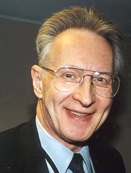 Two works by Stephen Lukasik, Distinguished Senior Research Fellow at CISTP in the Sam Nunn School of International Affairs, were featured. Two works by Stephen Lukasik, Distinguished Senior Research Fellow at CISTP in the Sam Nunn School of International Affairs, were featured.
Lukasik’s “Why the Arpanet Was Built” was on the cover of the July-September issue (Volume 33, Number 3) of the Institute of Electrical and Electronics Engineers (IEEE) peer-reviewed journal, Annals of the History of Computing. The ARPANET, or Advanced Research Projects Agency Network, was the core of what became the global Internet. Lukasik wrote, “The who, what, when, and how of the ARPANET is usually told in heroic terms …Writing from the viewpoint of the person who signed most of the checks for Arpanet’s development, I detail the rationale for investing U.S. Department of Defense resources for research and development of the first operational packet-switched network. The goal was to exploit new computer technologies to meet the needs of military command and control against nuclear threats, achieve survivable control of U.S. nuclear forces, and improve military tactical and management decision making.” Note: IEEE produces 30% of the world's literature in the electrical and electronics engineering and computer science fields, publishing well over 100 peer-reviewed journals.
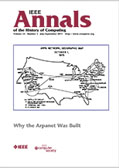 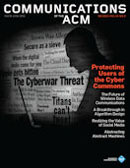 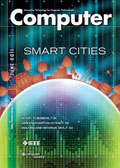
IEEE Annals Communications Computer
of the ACM
Lukasik’s “Protecting Users of the Cyber Commons” was a cover article for Communications of the ACM [September 2011, Volume 54, Number 9]. The publication is the leading print and online publication for the computing and information technology fields. Lukasik suggests the establishment of a global cyber “neighborhood watch” enabling users to protect their operations.
Dan Breznitz, Michael Murphree, and Sy Goodman authored a feature article in the June 2011 issue of Computer which focused on "Smart Cities." In “Ubiquitous Data Collection: Rethinking Privacy Debates," the trio define key issues and argue that “there is a need to develop a new framework or the analysis of the questions surrounding ubiquitous data collection and availability.”
They wrote, “The fact that the Internet enables massive collation and integration of data for examination and categorization of individuals is not widely appreciated or known." Among the examples they cited were that “extensive personal data on the clicks, selections, browsing habits, and preference of users has become big business,” and that life insurers have begun "using social network analysis, such as Facebook friends to determine a person’s likely life expectancy.”
|
A Special Poetry at Tech Event at Poet's House in New York City
On November 10 at Poets House in New York City, Poetry at Tech will present readings by four poets, McEver Chair Thomas Lux, and former McEver chairs Vijay Seshadri, Travis Denton, and Ginger Murchison.
The celebration is presented by Poetry at Tech, Poets House, and Bruce McEver. The event is free and open to the public. Find out more at http://poetry.gatech.edu/events.html
|
IAC Alums Named Rising Stars by Georgia Trend’s 40 Under 40
Trey Childress and Jason Anavitarte, both leading alumni of Ivan Allen College of Liberal Arts, were honored as rising stars by Georgia Trend magazine’s 2011 40 Under 40 Awards. Childress serves on the Advisory Board for the college.
Trey Childress earned an MS from The School of Public Policy and a BS from the Sam Nunn School of International Affairs (also GT Industrial & Systems Engineering). He is Founding Partner at Perdue Partners, LLC in Atlanta and has served as COO for the State of Georgia and as Director of the Governor’s Office of Planning & Budget. The School of Public Policy recognized him with a Distinguished Alumni Award in 2011.
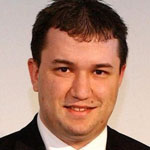
Anavitarte earned an MS in the School of Public Policy in 2004 and is now Senior Community and Government Relations Leader for Kaiser/Permanente in Dallas. He received Public Policy’s Distinguished Alumni Award in 2005.
Read the 40 Under 40 Profiles of Anavitarte and Childress.
|
Remembering INTA Undergraduate Naren Raghuraman
Naren Raghuraman, a student in the Sam Nunn School of International Affairs, New Jersey, was killed in a single-car accident on Friday, November 4.
With Naren in the accident were two Georgia Tech Aerospace Engineering students. Daniel Hickman died Monday evening from injuries sustained in the crash. Ratheesvar Mohan remains hospitalized.
Speaking on behalf of the college, Dean Royster said, "Our hearts go out to the family and friends of these young men and to everyone who knew them. We are saddened by this tragic loss."
Katja Weber, Professor and Interim Chair of the Nunn School who taught Naren in her International Institutions class this semester, wrote a personal message to INTA students.
“A very talented young man, Naren described himself as a language enthusiast. He was working on learning his sixth language, Japanese. In an autobiography at the beginning of the semester he wrote: "I dream of traveling the world and seeing at least a little bit of every country before I die.”
"I so wish this dream could have come true for him," said Weber. "Maybe this tragedy can serve as inspiration for us to make whatever trajectory we'll take in the future count.”
At the request of undergraduate and graduate student leadership and with the concurrence of President Peterson, the Athletic Department will include a moment of silence during the Nov. 10th football game to remember these students and express Tech community condolences. The moment of silence will occur just prior to the playing of the National Anthem at approximately 15 minutes to go on the game countdown clock or 7:47 p.m. The video and message boards in Bobby Dodd Stadium will be darkened.
Naren was from Princeton, New Jersey. IAC leadership is discussing with Naren's family the possibility of a memorial on campus sometime in the future.
|
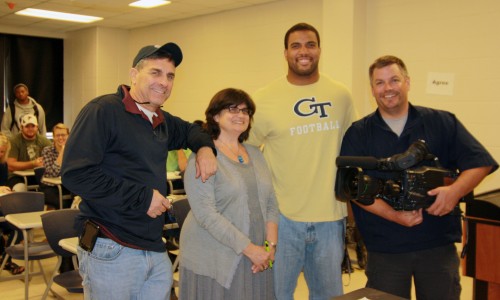
|
IAC Game On!
IAC was front and center during the October 29 homecoming game. ABC/ESPN filmed a feature in Carol Colatrella's class in LCC. International Affairs Professor Danny Breznitz was featured on the big electronic board as Professor of the Game.
ABC/ESPN Films in Colatrella's Class
The ABC/ESPN film crew visited LCC while producing a profile of #92, Jason Peters, who is enrolled in Colatrella's American Culture class. The profile aired on ESPN during the game broadcast.
Pictured above are ABC/ESPN's Greg Costa (l) and Jeff Hopson (r) with Professor Colatrella and Jason. GO Jackets!
Breznitz is Featured as Professor of the Game
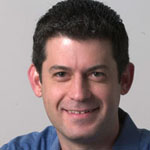 International Affairs Professor Danny Breznitz was featured on the field and on the big electronic board at half time. The stadium announcer introduced Breznitz as an International Affairs Associate Professor and Sloan Foundation Fellow in the Ivan Allen College of Liberal Arts and the College of Management and a Hyundai Professor of Excellence. International Affairs Professor Danny Breznitz was featured on the field and on the big electronic board at half time. The stadium announcer introduced Breznitz as an International Affairs Associate Professor and Sloan Foundation Fellow in the Ivan Allen College of Liberal Arts and the College of Management and a Hyundai Professor of Excellence.
"A world-renowned expert in conducting comparative research of rapid, innovation-based industries and their globalization strategies, Dr. Breznitz has served as an advisor on science, technology, and innovation policies for local and national governments in the United States, Asia, and Europe, and for multinational and international organizations such as the World Bank. This year, Dr. Breznitz published his second book, “Run of the Red Queen: Government, Innovation, Globalization, and Economic Growth in China,” which assesses the strengths and weaknesses of China’s economic system and provides insights on how other emerging market economies can adopt sustainable development strategies. Hyundai salutes Professor Dan Breznitz, one of Georgia Tech’s finest."
|
|

